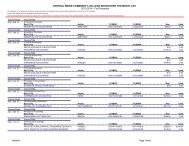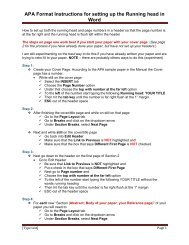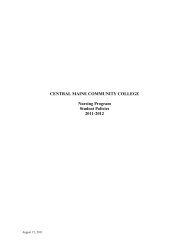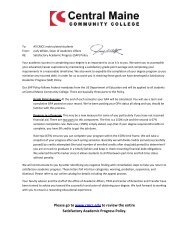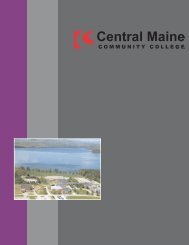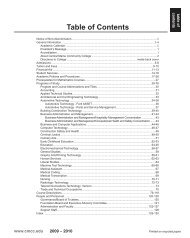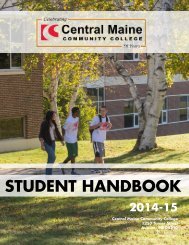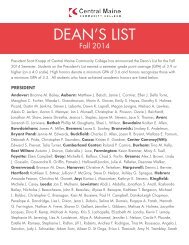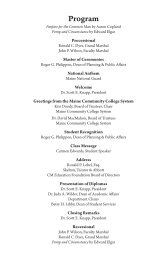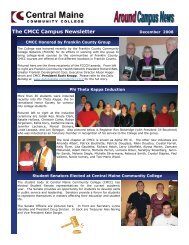Academic Policies and Procedures - Central Maine Community ...
Academic Policies and Procedures - Central Maine Community ...
Academic Policies and Procedures - Central Maine Community ...
Create successful ePaper yourself
Turn your PDF publications into a flip-book with our unique Google optimized e-Paper software.
programs<br />
of study<br />
Telecommunications Technology<br />
FairPoint (TTF)<br />
Program Description<br />
Telecommunications Technology: FairPoint is a corporate specific, Associate<br />
in Applied Science degree program designed for qualified employees.<br />
The goal of the program is to prepare a more highly educated work force in<br />
order to compete successfully in the rapidly changing telecommunications<br />
marketplace.<br />
<strong>Central</strong> <strong>Maine</strong> <strong>Community</strong> College faculty <strong>and</strong> administrators are participating<br />
with other community <strong>and</strong> technical colleges in <strong>Maine</strong>, Massachusetts,<br />
Vermont, New Hampshire, Rhode Isl<strong>and</strong> <strong>and</strong> New York in planning<br />
<strong>and</strong> delivering the curriculum. Selected employ ees are released from<br />
their work assignments to attend eight hours of classes for one day each<br />
week throughout the academic year. Students who meet the curriculum<br />
requirements can earn an Asso ciate in Applied Science degree in eight<br />
semesters.<br />
A laptop computerized virtual learning environment is provided to teaching<br />
faculty <strong>and</strong> students to facilitate extensive learning activi ty between class<br />
days through assignments <strong>and</strong> team communica tion. The virtual learning<br />
environment is a critical component for each course.<br />
Group <strong>and</strong> individual educational project assignments incorporate contents<br />
such as team building, mentoring by senior technicians, problem solving<br />
<strong>and</strong> troubleshooting of real tasks, customer serv ice for a diverse customer<br />
base, project management, information acquisition, individual responsibility<br />
for continuous learning, <strong>and</strong> the latest high technology field applications.<br />
This unique offering is made possible by the collaborative efforts of Fair-<br />
Point, the International Brotherhood of Electrical Workers <strong>and</strong> the participating<br />
colleges. It is also referred to as the Next Step Program.<br />
Program Educational Outcomes<br />
Upon completion of the Telecommunications Technology (FairPoint) Program,<br />
the graduate is prepared to:<br />
1. Help to define st<strong>and</strong>ards for quality <strong>and</strong> evaluating products, processes<br />
<strong>and</strong>/or services against those st<strong>and</strong>ards; doing the job right the first time,<br />
<strong>and</strong> doing it in a way that satisfies customers requirements.<br />
2. Work as part of a team to achieve mutual goals, building mean ingful<br />
<strong>and</strong> productive professional relationships regardless of per sonal differences,<br />
<strong>and</strong> coach others to enhance individual <strong>and</strong> team performance.<br />
3. Demonstrate a rigorous organized approach to planning work <strong>and</strong><br />
projects; ensure leadership among peers to ensure customer service<br />
projects are completed in a timely manner <strong>and</strong> in such a way as to<br />
completely satisfy customers.<br />
4. Demonstrate confi dence in applying knowledge of the Telecommunications<br />
Industry, especially up-to-date knowledge of FairPoint’s<br />
core technology, products <strong>and</strong> services for the purpose of being able<br />
to deliver these products <strong>and</strong> services to FairPoint’s customers in<br />
a timely <strong>and</strong> expert fashion; be driven by a recurring concern to do<br />
things better, or at a higher st<strong>and</strong>ard, than has been done previously.<br />
5. Conduct his/her work with a strong focus on the needs of the<br />
customer to a quality st<strong>and</strong>ard that builds trust <strong>and</strong> confidence for<br />
long term relationships; use effective interpersonal skills to build <strong>and</strong><br />
maintain relationship with others.<br />
6. Systematically obtain <strong>and</strong> evaluate information to develop <strong>and</strong> implement<br />
practical <strong>and</strong> cost competitive solutions to customer problems in a<br />
timely manner; see challenging situations as a means to learn.<br />
Associate in Applied Science<br />
Degree Requirements Class of 2011<br />
Courses for the Telecommunications Technology (FairPoint/IBEW<br />
NEXT STEP) Program includes three main areas of study: arts <strong>and</strong><br />
sciences, general education, electricity/electronics, <strong>and</strong> telecommunications<br />
for a total of 60 credit hours.<br />
Sequence of Courses:<br />
Semester 1<br />
Credit Hours<br />
BCA 120 Introduction to Computer Applications 3<br />
LER 011 Orientation Seminar *(a non degree *1<br />
credit, program requirement)<br />
MAT 130 Technical Mathematics I 4<br />
Semester 2<br />
ENG 107 Introduction to Writing 3<br />
TTF 160 Digital Systems for Telecommunications I 4<br />
Semester 3<br />
MAT 230 Technical Mathematics II 4<br />
TTF 161 Digital Systems for Telecommunications II 4<br />
Semester 4<br />
PHY 130 Physics 4<br />
TTF 162 Electrical Circuits 4<br />
Semester 5<br />
TTF 260 Introduction to Electronics 4<br />
TTF 261 Telecommunications I 4<br />
Semester 6<br />
TTF 262 Electronic Communications 4<br />
TTF 263 Telecommunications II 4<br />
Semester 7<br />
ENG 227 English Composition II 3<br />
TTF 264 Telecommunications III 4<br />
Semester 8<br />
SSC 216 Changing Nature of Work 3<br />
TTF 265 Telecommunications IV 4<br />
Note: Additional class <strong>and</strong>/or lab hours are conducted via an<br />
electronic network.<br />
Total Credit Hour Requirements 60<br />
Distribution of A.A.S. Credit Hour Requirements<br />
Humanities <strong>and</strong> Social Science - 9 (15%)<br />
ENG 107, 227; <strong>and</strong> SSC 216.<br />
Mathematics <strong>and</strong>/or Science - 12 (20%)<br />
MAT 130, 230; PHY 130.<br />
Concentration - 39 (65%)<br />
BCA 120; TTF 160, 161, 162, 260, 261, 262, 263, 264 <strong>and</strong> 265.<br />
74 www.cmcc.edu 2010 ~ 2011



